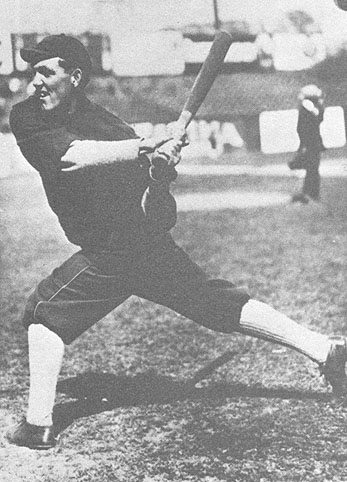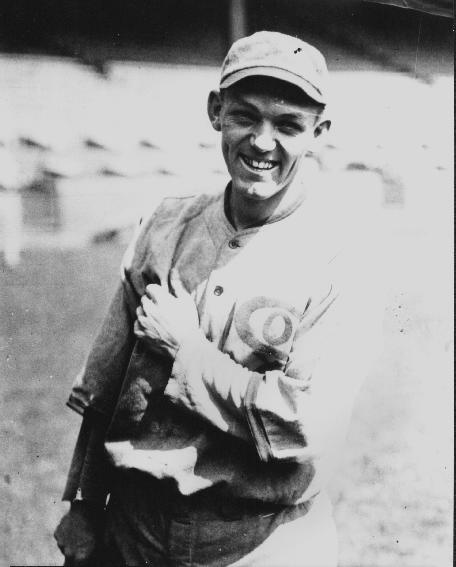 |
It's Time to Right a Wrong
Baseball needs to clear Buck Weaver's name
In 1921, as has been well documented, eight members of the Chicago White
Sox were placed on baseball's permanent suspension list for their roles in fixing the 1919 World Series. Arnold "Chick" Gandil,
Eddie Cicotte, Claude "Lefty" Williams, Oscar "Happy" Felsch, Fred McMullin, "Shoeless" Joe Jackson, and Charles "Swede" Risberg
all admitted to taking money from gamblers in exchange for losing World Series games. One man however, did not accept any
of the dirty money and played the entire Series to the best of his ability, yet was still subjected to Commissioner Kenesaw
Mountain Landis' harsh judgment. That man is George "Buck" Weaver.
For over 80 years, Weaver and his family have had to live with the stigma
of being associated with the "Black Sox" scandal. Now it is time for Commissioner Bud Selig to step up, do the right thing
and clear this innocent man's name.

|
| courtesy
of www.gingerkid.com |
Who is Buck Weaver?
Born on August 18, 1890 in Pottstown, PA, George Daniel Weaver, like most
young boys at the time, fell in love with baseball at an early age. Nicknamed "Buck" because of his happy-go-lucky nature
and passion for the game, Weaver moved steadily up the amateur ranks and the semipro circuit before joining the Chicago White
Sox in 1912.
After struggling through his rookie season, hitting .224 in 147 games,
Weaver became acclimated to the major league game, and raised his average to .272 in 1913. By 1917, the White Sox had become
an American League powerhouse, and Weaver had developed into one of the game's best third basemen. Thanks to hours of work
with White Sox coach Kid Gleason, Weaver's defense at the hot corner was considered among the game's best. After hitting .284
for the AL pennant winners during the regular season in 1917, the standout third baseman hit at a .333 clip in the Sox six
game World Series triumph over the New York Giants.
A .300 hitter in 1918, Weaver nearly matched that success in 1919, batting
.296 as the White Sox won another AL flag. Chicago, of course, lost that World Series to the Cincinnati Reds in eight games
(the owners voted to extend the Series to a best of nine affair in 1919 to make up for lost gate receipts during the war-shortened
1918 season). During the Series, Weaver hit .324 (.333 in the losses) and played flawless defense.
Playing amid rumors of a scandal, Weaver had his best season in 1920, hitting
.331, scoring 102 runs, and driving in 74. After flirting with first place for most of the season, the Sox fell short of the
AL Pennant when, with three games to go, the before-mentioned eight players were indicted for conspiracy to destroy Charles
Comiskey's business and defraud the public. A reluctant Comiskey suspended the accused players for the remainder of the season.
Weaver, meanwhile, maintained his innocence and requested a separate trial.
His request was denied, but the eight men were acquitted on all charges. During the course of the court proceedings however,
all eight players admitted knowledge of the fix, while seven of them admitted to taking money from gamblers. Only Weaver maintained
that he had not accepted any money. The other seven player's testimony supported his claim.
At the time, gambling ran rampant in major league baseball, and newly appointed
commissioner, former federal judge, Kenesaw Mountain Landis, was determined to put an end to it. On August 3, 1921, one day
after the verdict, the Commissioner placed all eight of the acquitted players on the permanent suspension list.
At age 31 Weaver's career was finished. In nine seasons, he compiled a
.272 career average, 172 stolen bases, 420 RBI, and 1,308 hits. Following his playing days, Weaver remained in Chicago, coaching
girls softball and working at the window of a race track before settling in as a clerk for the city of Chicago. He tried,
on multiple occasions, to apply for his reinstatement. However, each time, his appeals fell on deaf ears.
On January 31, 1956, while walking down the sidewalk of a Chicago street,
George "Buck" Weaver suffered a massive heart attack and died. He was 65 years old.
What was Weaver's Crime?
"No player who sits in conference with a bunch of crooked players and
gamblers where the ways and means of throwing games are discussed and does not promptly tell the club about it will ever play
professional baseball."
-Judge Kenesaw Mountain Landis, 1921
Despite not taking money from the gamblers and playing on the level
during the Series, the Commissioner felt that Weaver should be permanently suspended because he had prior knowledge of the
fix. In reality, his only true crime was not breaking the trust of his teammates and closest friends.
While it is true that he did attend some of the early meetings that the
crooked players held to discuss the details of their plot, Weaver made it clear that he was not going to cooperate and was
quickly froze out by the group. Knowing that they had enough players on their side to carry out the fix (most notably Cicotte
and Williams, the club's best two pitchers), the crooked players did not object when Weaver decided against joining their
group. Besides, Weaver's exclusion just meant more money for the rest of them (although only Cicotte received the full amount
of money he was promised).

|
| courtesy
of www.gingerkid.com |
An Unjust Ruling
If Weaver had decided to inform the club of the plot, it's doubtful anyone
would have listened. Comiskey had heard the rumors swirling, but chose not to act, fearing the negative publicity would destroy
his investment. At the trial in which he was supposed be the defendant, the owner's testimony was very sympathetic toward
the players plight. Many believe that Comiskey even paid for the player's "dream team" staff of attorneys. He had built a
championship caliber team and wanted them back on the field as soon as possible.
During that era, players would not expose the misdeeds of other players,
what happened within the team, remained with the team. It is an attitude that still exists today, although probably not to
the same degree. If Weaver had gone to Comiskey (providing he had actually wanted to hear it) or any other authority figure
with his knowledge, he would have lost the respect and confidence of his peers. It just wasn't the right thing to do, in his
mind, or in the mind of any other player.
Ironically, when all of this happened, Landis' rule wasn't even on the
books. Weaver essentially violated a rule that would not be put into place for almost two years. There is no possible way
that he could have been aware of the consequences of his lack of action. In that sense, Landis' decision on all eight players
is unconstitutional. However, major league baseball has long been the exception to our nation's most revered and important
document.
Buck's Backers
Their are currently two web sites that have taken up Weaver's cause. One,
www.gingerkid.com, is maintained by Nola Software Systems of Tallahassee, FL, which also maintains a site for the Shoeless Joe Jackson Society
(www.blackbetsy.com).
"Since we maintain (the Jackson) site and are very active in having Joe's
name cleared, the nature of progression was to also have Buck Weaver's name cleared as well," said the company's official
historian, Mike Nola. "We put up this web site to help educate the public as to the injustice done to him. (Weaver's) only
sin was guilty knowledge, not ratting on his friends. His punishment did not fit the supposed crime of guilty knowledge."
While some believe that fellow banishee Pete Rose, will be reinstated in
the near future, Nola does not necessarily believe that Weaver would follow, "Rose has a distinct advantage over Buck in that
he can go on TV and write books -- he can basically be in our face," he said. "Buck doesn't have that opportunity and therefore
may not get the same recognition from the Commissioner that Rose does."
Weaver's most ardent supporter is Dr. David Fletcher, an occupational medicine
specialist and co-founder of SafeWorks Illinois, a private medical practice. Fletcher funds and publishes www.clearbuck.com, while actively campaigning for Weaver's reinstatement.
"I am sort of a real-life Ray Kinsella," Fletcher said. "My mission is
to clear Buck Weaver. Instead of building a baseball field in Iowa, my mission is to bring a dead Black Sox victim back into
the good graces of baseball. For the last 15 years, I have been haunted by Weaver's story."
Fletcher says that during his wedding in 1998 at site of the old Comiskey
Park's home plate (now part of a parking lot adjacent to the new stadium) he was "overcome with Weaver's spirit." Then, just
last year, another brush with the supernatural led him on a unique journey.
"On February 1, 2003, the day Comiskey Park II was renamed US Cellular
Field, I was overcome with the spirit of Buck Weaver while standing at the old home plate," Fletcher explained. "His ghost
told me I had to seek out his family and bring them to Chicago for the upcoming All Star game to revive interest in baseball's
injustice to him."
From there, Fletcher headed to Branson, MO, home of Pat Anderson, Weaver's
niece and surrogate daughter. "(It) was like the trip Ray Kinsella, in Field of Dreams, took to Boston to meet Terrence
Mann," he said. "Pat thought I was a nut case and could not believe I was genuine in my interest in clearing Buck's name."
Fletcher next attended the All Star Game festivities where he launched
the campaign with the help of a public relations firm, Serafin & Associates. Along with a group of supporters, he also
made a trip to Cooperstown, NY for the Hall of Fame's 100th Anniversary Celebration and handed out petitions and T-shirts.
Because of their efforts, Fletcher's group was able to collect 10,000 signatures
calling for Weaver's reinstatement. In October the petition was sent to commissioner's office and, for the first time, Selig
went on record saying that Weaver's case is being reviewed.
Fletcher's crusade continues to build up momentum, his plans for 2004 include
a booth at Sox Fest in February, and a presentation on March 12 at the Best Western Inn in Tucson, AZ.
Making Amends
The most popular causes are not always the most worthy ones. While thousands
of fans clamor for Pete Rose and Joe Jackson to be reinstated, Buck Weaver is a far more deserving candidate. Rose has admitted
betting on baseball and his own team, and Jackson admitted taking the gambler's money. No, Weaver is not a Hall of Fame caliber
player like Rose or Jackson, but that should not detract from the injustice of his plight.
You may say, "Weaver's been dead for nearly 50 years, and he isn't a Hall
of Fame caliber player. What good will reinstating him do?" Well, at the very least, his name would be removed from the permanent
suspension list. If that happens, it could prompt the Chicago White Sox to hold a day in his honor and celebrate his career.
Close your eyes for a moment and visualize this: Buck Weaver Day -- a bright,
sunny afternoon at Comiskey Park under the clear, blue, summer sky.
Buck would surely be smiling somewhere.
-David Zingler
www.ClearBuck.com
www.GingerKid.com
Weaver's page @ Baseball-Almanac.com
*Click here for FEEDBACK*
Simply Baseball Notebook
|
 |

